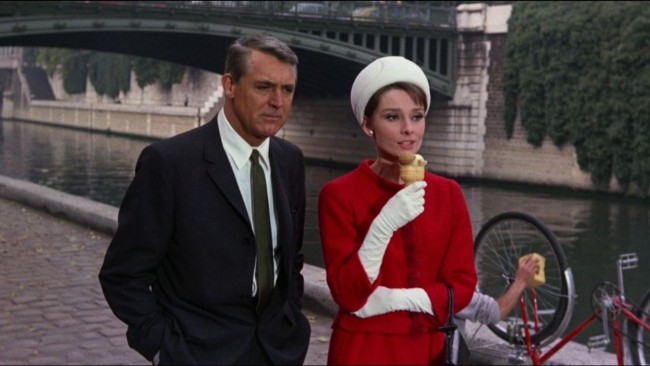Charade
dir. by Stanley Donen
Stanley Donen’s 1963 espionage comedy Charade works as an effervescent reprieve from the grave and serious movies of today. It’s fun, frothy, and taps about like Gene Kelly’s feet, never far from a nudge or a wink, all of which is spritely complimented by Henry Mancini’s tip-toe twinkle of a movie score. With a loose and limber cast, balletic camerawork, a colorful palette suffused with nothing but primary colors, and a script that spins with zippity-doo-dah dialogue, Charade’s an example of showmanship at showmanship best. What’s most interesting about the film—and what ultimately flattens its bubbly charm—is the unorthodox decision to place a woman front and center of a ‘60s spy thriller—a genre typically anchored by the unflappable, cocksure man’s man—your James Bonds and Harry Palmers: rugged individuals built with equal measures of wit and brawn, good with guns, and even better with women. ButCharade’s not interested in any of that machismo hoo-ha, which is evident from the film’s opening scene when we see a dead man of questionable air chucked out of a speeding train. It’s as if director Stanley Donen meant for the scene to act as a metaphysical comment on his disinterest in following the espionage-driven dalliances of yet another man, so he scraps the idea and instead situates us up in the mountain peaks of a fancy-looking ski lodge where we’re introduced to the real hero—or rather, heroine: Regina Lampert (Audrey Hepburn)—or Reggie as she’s eventually dubbed by the charismatically slippery Cary Grant figure.
It’s a woman that poses as the crux of Donen’s Charade—both acerbic and flippant, careless and bored, always eating, perpetually unsatisfied, totally insatiable, Hepburn plays Reggie like a woman luxuriating in the conquering of her “rich white girl” ennui—but is she really the crux of the film? Or is she more of a giddy spectator totally enchanted by the movie-like occurrences unfolding before her? Unlike all the other characters in the film, Reggie seems to be the only one without a mask or ulterior identity, and furthermore, the only one with a moral center. She’s fascinated by the proceedings more than anything else. When we first see our young heroine up in the white enshrouded summits of her snowland sojourn, we meet a Reggie struck by severe listlessness—of the blah variety. She’s hidden behind a pair of moon-sized shades, complaining about any and all trivialities, shoveling food into her endless void, floating and coasting. This is very different from the jazzed-up, glassy-eyed ingenue we later see flicking popcorn into her mouth while watching super secret spy business go down. At one point or another, every character in the film’s coterie of misfits and murderers is suspected to have murdered the man on the train—the man being Reggie’s former husband, a man she barely knew, if at all. As the movie nonchalantly jumps, swerves, and tumbles through its own obstacles of cool, you quickly realize that this isn’t your by-the-books spy movie, it’s operating on a level a whole lot deeper, with a slipperiness far slipperier than any actual spy movie: it’s a movie of profoundly dark cheekiness and—most importantly—intelligence.
As we come to find, Reggie never had anything to do with her husband’s death, nor the money he supposedly stole from his World War II buddies—played with wonderful bluster by James Coburn (Affliction, Our Man Flint), Walter Matthau (The Odd Couple, Grumpy Old Men), Ned Glass (West Side Story,Fortune Cookie), and George Kennedy (The Naked Gun, Cool Hand Luke). There are moments here and there where the inkling of cleverness in Reggie’s ever-iridescent eyes suggests a deviancy fully capable of the surreptitious dealings necessary to abscond with $250,000, but it’s almost always immediately snuffed out by one of Grant’s many underhanded reproves—most of which have to do with the inappropriate difference in their years. But Reggie doesn’t want the money. When she first discovers that her and her husband’s Baroque-ornamented digs have been wiped clean of all its belongings, she barely reacts. Reggie shrugs it off as a mere inconvenience. No, money’s never been the issue for Reggie. That immeasurable honor belongs to boredom. Reggie is an impossibly bored young lady in want of a little nourishing entertainment. And to that end, the ever-changing Cary Grant makes for the perfect balm. The Cary Grant figure offers Reggie the razzle-dazzle that Hollywood’s promised time and time again. He fills every attractive archetype she can think of: the dashing old gentleman, the knight in shining armor, the bad boy you can’t help but want to reform, and—finally—the ultimate good guy: a man worth his salt in marriage. With every new shift in alter ego Grant hits the tropes with loosey-goosey aplomb. Even though it’s Grant’s character who resolves the film’s narrative conflicts—who stole the money, who threw Lampert off the train, who killed the others—its Reggie who walks off with the film’s paramount achievement: in a film where control is of the utmost elusiveness, it’s Reggie who attains everything she wants—excitement, love, intrigue, and a brand new husband to boot, and all while eating and skipping her way through Paris.
As previously mentioned, Charade boogies and glides with the exuberant spirit of a Gene Kelly dance number. The various characters and pieces shift and slide with stunning maneuverability, to the point where the game’s been calibrated and recalibrated so many times that every varying option seems possible. Maybe Grant’s Peter Joshua did it. Maybe Reggie did it. Maybe no one did it. Donen shuffles the deck with such frequency that the issue of the money and murder becomes almost secondary to the interplay between Hepburn’s surprisingly adaptable Reggie and Grant’s always malleable Peter Joshua. I’ve never seen Hepburn and Grant so playful before. Maybe Hepburn, but not Grant. It takes some time for Grant to shed the dapper, put-together suaveness we’ve grown accustomed to in order to reveal the consummate goofball lying dormant beneath with scenes like the one he has in Reggie’s bathroom. Fed up with Reggie’s constant pestering about showering in her room instead of his, Joshua Peter hops into the shower, fully clothed, and suds up his sartorial duds top to bottom—and all at the expense of Reggie’s bemusement, the spectator’s bemusement, and—ultimately—our bemusement. And that’s key to the film’s success: everyone’s bemusement. There are plenty of threads left dangling by movie’s end that Donen refuses (or forgets) to tie away—like how the one-handed man was rescued from his cliff-hanging predicament. Donen realizes quick and early that his film’s far too fun and fiddle-footed to occupy itself with such petty logistics. Instead, he lets it all hang loose.
That being said, I wish Reggie had demonstrated at least a smidge bit more awareness as a character. At no point does she take control of the situation herself; instead—like a damsel in distress—she repeatedly relies on Peter Joshua to arrive deus ex machina-style to save her from the film’s assemblage of baddies. As Joshua Peter puts it: a girl so young shouldn’t be left alone to such shady business. What’s most troubling is that he and the film’s script seem to believe it. Sometimes I felt as if I were watching a film told expressively from the point-of-view of one of 007’s vapid, bobblehead Bond girls. Sure, the focus is finally on the girl, but what does it matter if she’s nothing more than a verbal sparring partner for Grant and his various personas to go tit-for-tat with. It’s unfortunate, but it’s this throat-seizing hiccup that—in the long run—renders this flute of champagne somewhat flat. It doesn’t derail the film completely, but it certainly leaves an acrid taste in the back of one’s throat.
But hey, it was the sixties. There’s only so much social progress you can ask for from your movies. Thankfully things have since changed for women in Hollywood.
Or have they…?






